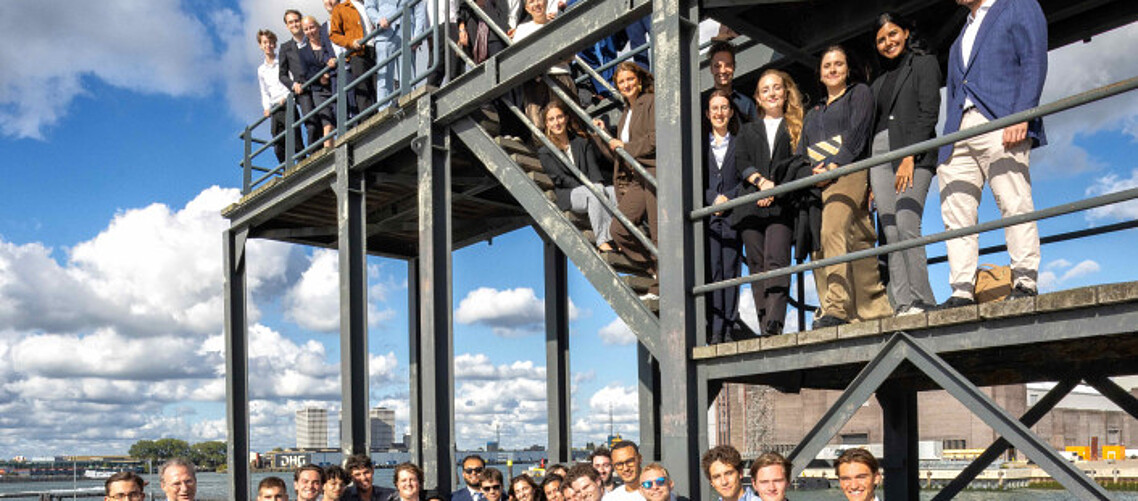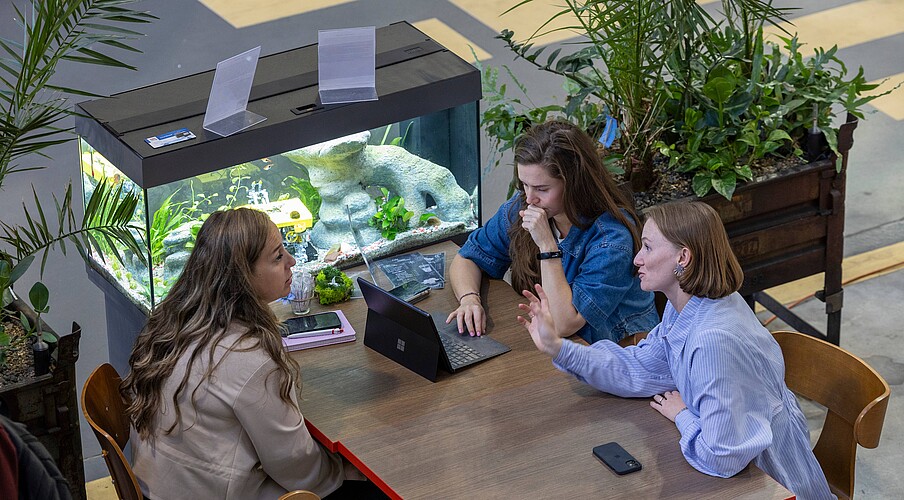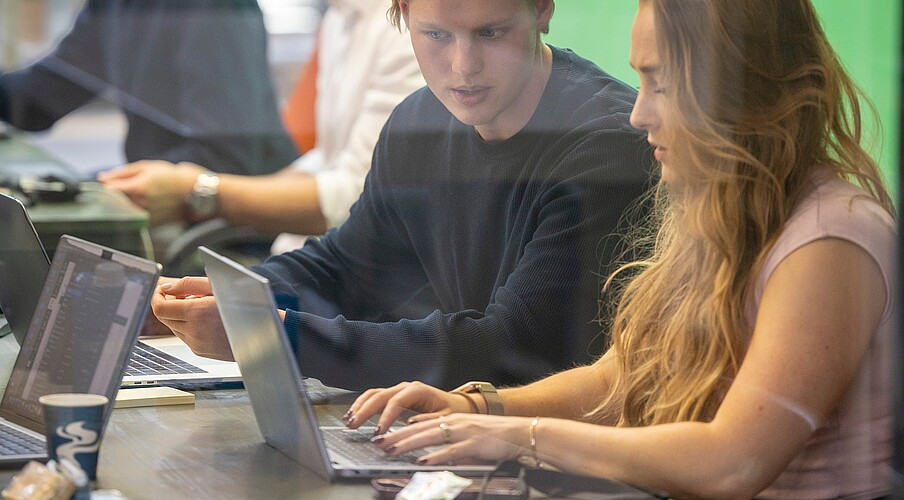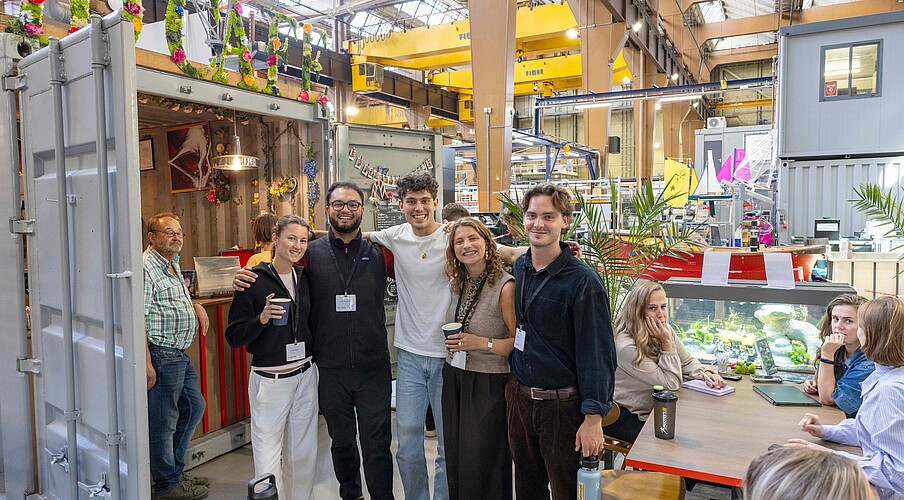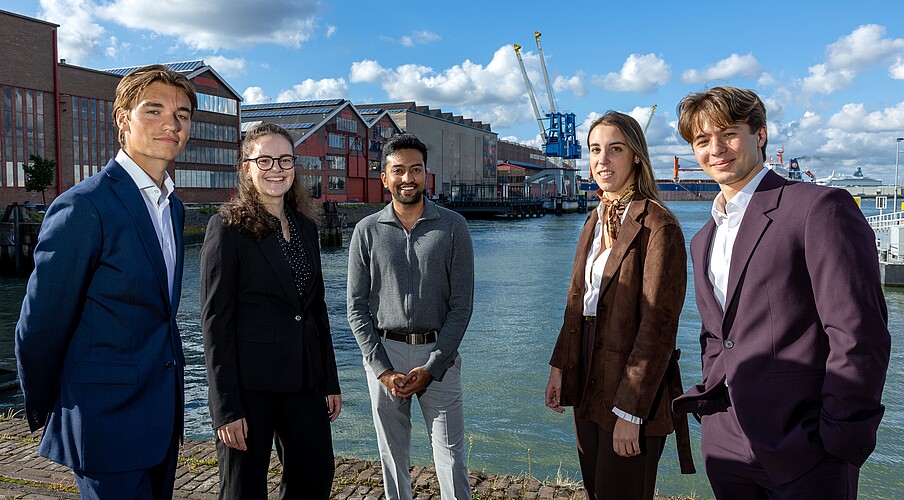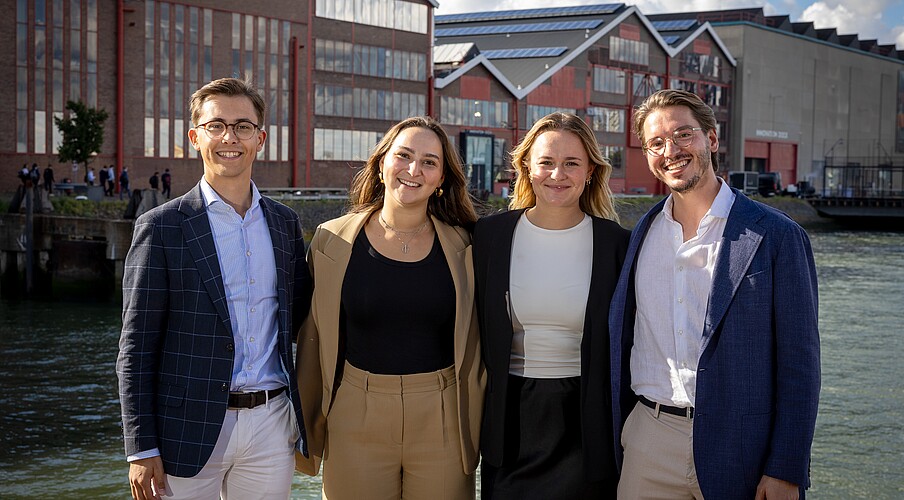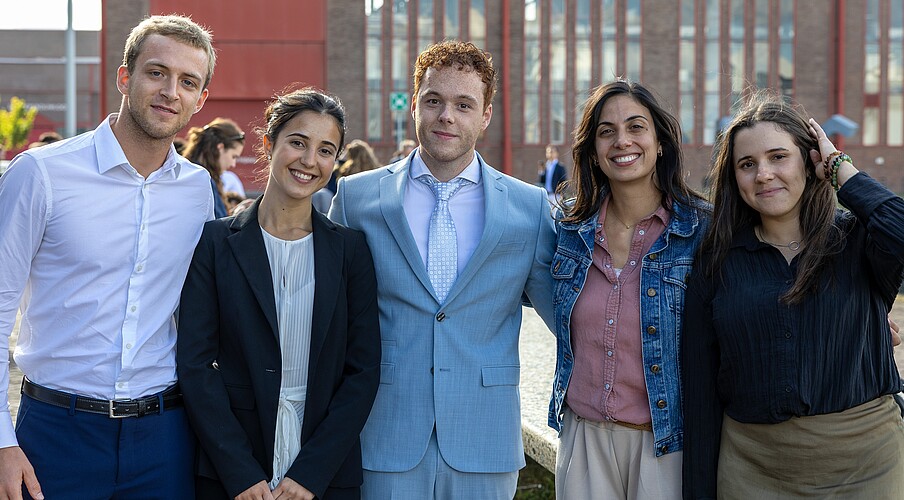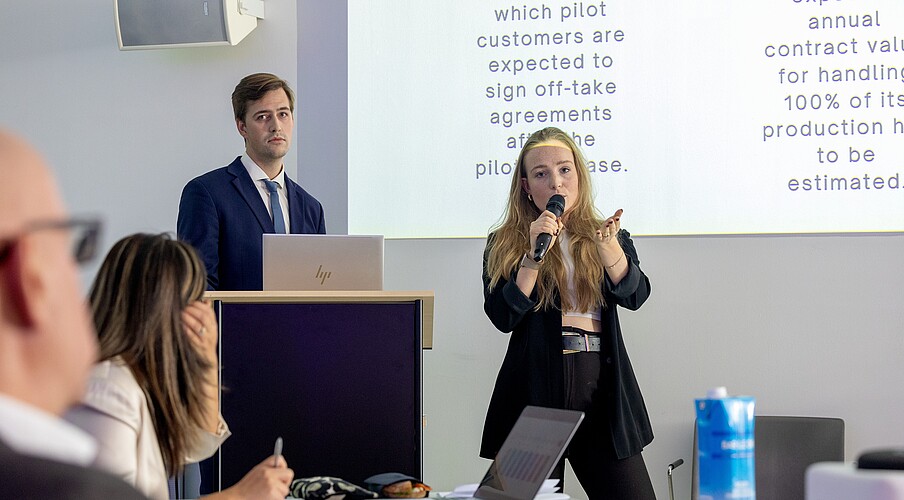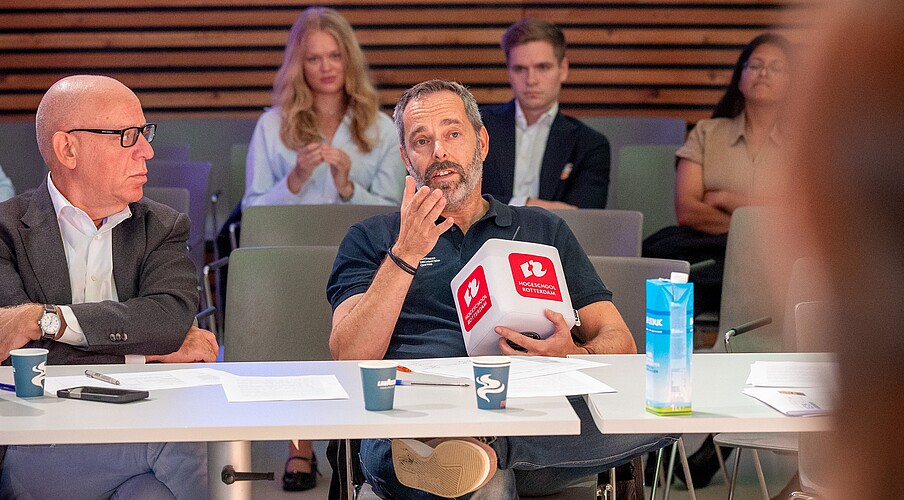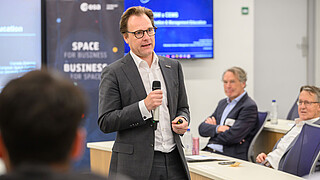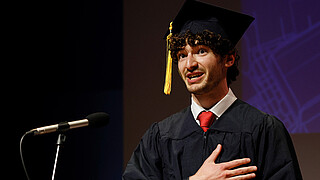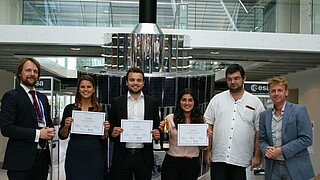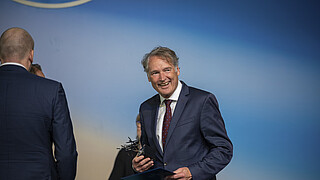Throughout the 2025 Block Seminar, the link with the Port of Rotterdam was quickly established and students from RSM and other schools of the CEMS Global Alliance immersed themselves for a week in the world of port and space.
International students at work
After a kick-off at European Space Agency – European Space Research and Technology Centre (ESA ESTEC) in Noordwijk, the 60 students moved to RDM Rotterdam. Divided into two tracks, one group of students worked to develop a concept for a mobile port that could also benefit the space industry. The other group worked on advising the eight young companies from the ESA BIC Noordwijk and RDM Innovation Dock on some of the strategic challenges they had been experiencing.
“For us, expanding to RDM was a great opportunity,” said Academic Director Dr Giuseppe Criaco. “The collaboration with ESA has been running for over twenty years. By expanding to RDM, we have connected our international students even more strongly with the city of Rotterdam and its port. The Port of Rotterdam is a key force in the city’s innovation ecosystem and adds significant international appeal. This collaboration strengthens RSM’s connection to its home city while offering national and international students valuable exposure to one of Europe’s most dynamic economic hubs,” Dr Criaco explained. “We were also curious about the alchemy between business and tech entrepreneurship, as these two have met here during the week. Our students got to apply their knowledge to young, innovative companies – an entirely new phenomenon compared to the well-known multinationals.”
“But the week was not just about exposure or nice experiences,” added CEMS Programme Manager Marta Crabbia. “It was a week of hard work.” The CEMS master is one of RSM’s most international and competitive programmes, where students from all over the world come together. “We made sure the student groups were as diverse as possible. Because we believe that more diversity leads to more success, we hoped that our students would come up with recommendations that companies could truly benefit from.”
One useful recommendation, for example, came during the students’ discussion with Gravity Gardens, co-founded by Paulino Valdes (CEO) and Robin Le Vigouroux. During this session, the RSM students were tasked with helping to improve the startup’s financial model and revenue projections. The students’ solution was to apply an innovative methodology to accelerate and increase the yields of crops grown on Earth. In this instance, the link to space was the use of bioregenerative life support systems under simulated planetary conditions.
Mr Valdes: “What the students delivered was a great help to us in forming a template that we could use as a financial model to present to an early stage investor. I would definitely recommend startups to get involved in future CEMS projects as it really helps for your business model to get different perspectives.”
Business meets technology
Dr Yu Liu, associate professor in the department of Strategic Management and Entrepreneurship at RSM, supervised the new venture consulting track during the Block Seminar and selected the participating startups. “We looked at entrepreneurial challenges and sought out companies that were still exploring their business models; young startups in their beginning phase or growth phase which could really benefit from fresh insights.”
One such company is Coastruction, which builds artificial reefs with self-made 3D printers to protect coasts and restore underwater nature. Founder Nadia Fani was enthusiastic: “The students asked sharp questions that made me look at my company differently. Their advice to target specific investors was so valuable that I’m now considering hiring a business intern.”
André Schiele of X-Laboratory and HooH Energies also guided students during the week and was very positive: “I truly feel that, together with ESA and EUR, we were able to contribute to ideation with the companies at the Innovation Dock. My students worked very independently and mastered the complex technology behind HooH Energies. Then they stepped outside the box and put themselves in the shoes of an investor to think about how my company could grow and attract investments. That delivered fresh perspectives we can really use.”
Jurgen Zijlmans of Osbit added, “Although the project was very short, the students gave us excellent insights. For tech-driven companies like ours, the students can be of real value. This will also apply to other companies at RDM Rotterdam, and beyond, in the Rotterdam port and maritime sector. They look at our challenges with a different perspective.”
Jard van Lent, innovation connector at RDM, is in daily contact with entrepreneurs on the Erasmus University Rotterdam (EUR) campus, to discuss their successes but also where opportunities remain. “My role is to find out what is missing and how I can fill that gap. Often, by connecting companies to the right knowledge or partners. Several startups have expressed the need for more business knowledge. That’s how I got involved in the collaboration between CEMS Global Alliance and ESA,” Jard explained.
OpenAtlas co-founders Harry Marshall (CEO) and Ezekiel Barnett connected with a group of students, and challenged the group to identify potential investors for the startup’s fundraising efforts. The students assigned to OpenAtlas came up with the idea to transform remote sensing technology into accessible, cost-effective tools for businesses that tackle supply chain compliance, which links to using space satellite data and remote sensing.
Mr Marshall: “The students identified different types of investors – be they in the space industry, climate industry, impact industry – and came up with the rationale for why these would be better or worse based on our product and what the industry's doing. The diverse team of students really helped us in our fundraising efforts. They showed a fair bit of intuition for where to look and responded well when I provided some pointers. The collaboration was definitely worth the time and the effort, absolutely.”
The concept of the mobile port
The second track was led by Dr Gaham Cross, senior lecturer in the department of Technology and Operations Management at RSM. He guided the students through a design thinking process around the central question: what if a port were mobile? “Normally, a port is fixed in one place. But imagine you could move it – what would change? The students discovered that innovation and business development are not fixed paths, but revolve around experimenting and new perspectives,” said Dr Cross.
RDM Rotterdam and the Innovation Dock turned out to be the ideal environments to explore new perspectives like these. “By being immersed here for a week, the students were able to go in-depth,” explained Jaap van den Braak, project manager at Port of Rotterdam. “Which functions, companies, and services can you find in the Port of Rotterdam? And what are the main challenges of the moment – such as the energy and materials transition, grid congestion, the business climate and critical infrastructure? All this knowledge provides essential background to think about how part of the port could become mobile.” The students’ solutions ranged from modular building blocks for constructing a mobile port to AI-driven software which could monitor logistics flows. They produced a wealth of truly innovative ideas. Above all, the students brought a fresh and positive perspective to the Port Industrial Complex.
Taking experimentation to heart, the student group assigned to Olivier Oomen and Andrey Nikipelov, co-founders of HallTech, came up with an innovation of their own. They were challenged to identify a focused market segment and formulate a robust market entry strategy for HallTech. Using electrical space propulsion technology, the students came up with the idea to innovate physical vapour deposition (PVD) technology to enable cost-effective renewable energy solutions.
Learning by doing
For the 60 students, the Block Seminar was all about learning by doing. Maghna from India immediately noticed the cultural differences: “Academically and personally, the Netherlands is completely different from my home country.” Her Portuguese classmate, Manuel, mainly saw opportunities: “I wanted to learn how to apply advice practically. Here we finally got to apply what usually remains theory.”
At Dutch Drone Company, students worked on a feasibility study for using drones in landing systems. Business Development Manager Willem Jan Boer: “The students took this on independently. The link between aerospace and business is what made this programme so valuable.” This assignment brought aerospace, innovation, and business together. “We really enjoyed working with students. That’s the beauty of the Innovation Dock – all kinds of knowledge can come together here. Everyone is doing something different, and a programme like the Block Seminar adds even more exchange and connection,” Boer said.
Diversity, role models and impact
Alongside knowledge-exchange, diversity played an important role. Professor Liu: “The maritime sector still holds a rather traditional image. Through programmes like this, we want to show that talent has many faces. For students, it’s important to see role models who embody diversity.” CEMS Programme Manager Marta Crabbia remains enthusiastic after years of involvement: “Every edition, students surprise us with their ideas. It’s a unique mix of cultures, backgrounds and disciplines that reinforce each other. I hope companies can offer students an innovative perspective on their existing business ideas and strategies. This first course of their master programme is an enriching experience.”
A good example of this took place when the student group assigned to Turtle Island Space, founded by Brian Treacy, was challenged to identify new customer segments for his educational-focused startup. The group devised an online educational service that uses satellite data and Earth observation data to access real-time space data. In a sense, the group created yet another link from classroom to space exploration.
Learning and living in Rotterdam
The international students were impressed with their week at RDM. “We’ve never experienced such an inspiring learning environment,” said Máté from Hungary. “You literally see the engineers at work here. That’s hugely motivating.” For many, Rotterdam was a deliberate choice. “I was looking for a cosmopolitan city with international energy, bigger and livelier than Bergen in Norway, where I currently study,” said Antony from India. Laura, from Italy, added: “I was in doubt between Brazil, Sydney or Rotterdam, but the combination of a top university and a city that’s neither too big nor too small made this the perfect choice.”
A promising start
The Block Seminar programme could not have asked for better hosts than ESA and RDM Rotterdam, and the programme could deliver a week full of knowledge exchange, fresh perspectives and inspiring encounters. Students, companies and faculty all returned with new insights. This premiere clearly left everyone wanting more.
